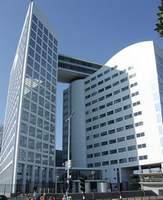For observers and advocates of the International Criminal Court (ICC), the Feb. 26 U.N. Security Council resolution imposing sanctions on Libya (.pdf) was nothing short of a breakthrough: It marked the first time a decision to refer crimes to the ICC was backed by all members -- including the United States, which has been openly hostile to the court for much of its existence.
Three weeks later, the U.S. showed support for the ICC yet again, albeit less publicly. During informal talks at the Security Council on March 18, a Kenyan delegation lobbied for a one-year deferral of two ICC cases stemming from the country's 2007-2008 post-election violence that claimed more than 1,000 lives. High-ranking Kenyan politicians have been named as suspects in both cases, and the delegation argued that the court's actions jeopardized "international peace and security." But the U.S., joined by France and the U.K., steadfastly opposed the deferral bid, effectively killing its chances.
In light of these two endorsements, can the U.S. now be counted among the court's staunch allies? Not exactly, experts say.

